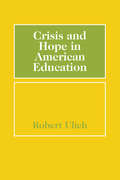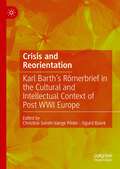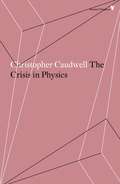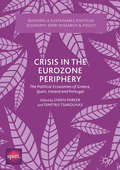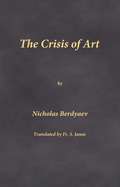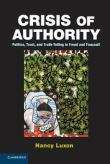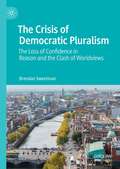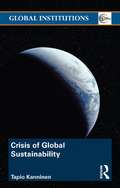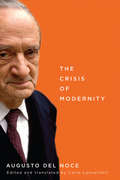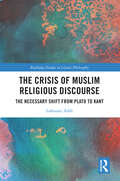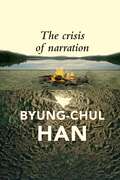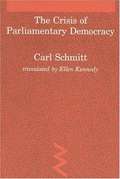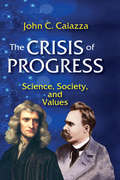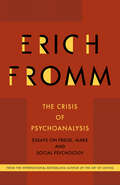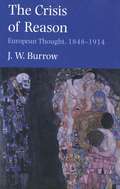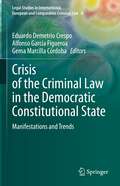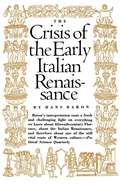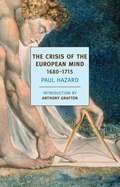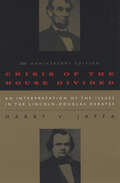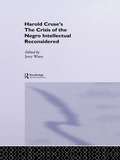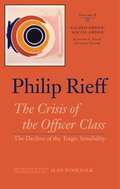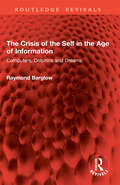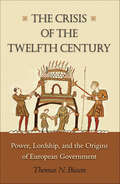- Table View
- List View
Crisis and Hope in American Education
by Robert UlichThis book evaluates the educational system of the United States from schools for the young up to universities and various forms of adult education. It is not confined to the evaluation of intellectual achievement. Rather it tries to arrive at some judgment as to whether schools help people acquire the degree of maturity necessary for participation in the work of a nation called upon to assume world responsibilities.Education, rightly conceived, is the process by which a growing person, according to his individual capacity, is prepared to understand himself, his place in society, his relation to the universe, and to act upon this understanding. A nation, to whatever extent it can afford to do so, should help future generations to strive for such achievements. But although this obligation is generally accepted by the American citizen, its practical requirements are still not fully understood.A classic soon after its original publication, this book is timelier today than ever. The author convincingly articulates the view that all our efforts at raising the intellectual and moral standards in our high schools are doomed to failure unless we boldly pair the right subject with the right talent. He demonstrates how we can achieve this without rejecting the precious heritage that is our tradition of free secondary schooling for all who can profit by it: his goal is nothing less than the creative combination of quality and justice in education.Ulich's prescriptions for education are bold and prac1/4tical. The boldness is best characterized by his contro1/4versial suggestion that the emotional sphere serves as the means of unifying the highly diverse American society. We see the influence of modern theory and its disenchantment with the merely intellectual theory as a basis for understanding, communication, and meaning. The institution that Ulich proposes is an "ideal" one, but it is described in considerable detail. Its buildings, facilities, curriculum, and informal programs are designed to provide shared emotional experiences while retaining the need for intellectual differentiation. 1/4
Crisis and Reorientation: Karl Barth’s Römerbrief in the Cultural and Intellectual Context of Post WWI Europe
by Christine Svinth-Værge Põder Sigurd BaarkThis book uses Karl Barth’s Der Römerbrief (1922) as a prism through which to explore the role of religion and its interactions with cultural and political thought in the turbulent interwar period in Europe. One of the most influential books in twentieth-century protestant theology, Der Römerbrief found Barth arguing that the crisis of the time was grounded in an even more profound crisis that pertained to the human condition as such. While much research has been conducted on Der Römerbrief, most of it has focused on the book’s explicit theology. The aim of the present volume is to mark the centenary of this seminal book with a broader investigation into the movements of thought within Der Römerbrief and its reception and impact within its cultural and intellectual context. This broader approach by a range of Northern European researchers brings attention to interconnections between cultural and theological movements in times of crisis.
The Crisis in Physics
by Christopher CaudwellCaudwell’s controversial book offers an astute and enduring diagnosis of the maladies of bourgeois epistemology.
Crisis in the Eurozone Periphery
by Owen Parker Dimitris TsarouhasThis book investigates the causes and consequences of crisis in four countries of the Eurozone periphery – Greece, Spain, Portugal and Ireland. The contributions to this volume are provided from country-specific experts, and are organised into two themed subsections: the first analyses the economic dynamics at play in relation to each state, whilst the second considers their respective political situations. The work debates what made these states particularly susceptible to crisis, the response to the crisis and its resultant effects, as well as the manifestation of resistance to austerity. In doing so, Parker and Tsarouhas consider the implications of continued fragilities in the Eurozone both for these countries and for European integration more generally.
The Crisis Of Art
by Nicholas Berdyaev S. Janos1st English translation from the Russian: "The Crisis of Art," an insightful booklet of 47 pages by the Russian religious philosopher Nicholas Berdyaev in 1918, originally comprised 3 articles. The present English text has been expanded into 9 related articles written by Berdyaev during this period, arranged into a threefold triadic schema. The 1st triad of articles in the present text are those contained in the original 1918 Russian text. The cover article, "The Crisis of Art," serving also as title to the booklet, examines cultural trends in art, both visual and literary, such as Symbolism, Decadentism, Cubism, Futurism (Filippo Marinetti) with mention of now obscure figures as Chiurlenis. Both "Picasso" visually and A. Bely's 1916 "Peterburg" novel give expression to the disintegrative features of the modern consciousness. The second triad of articles concern the Russian cultural figure, Vyacheslav Ivanov, mentioned in the initial article, concerning the lost aspect of "theurgy" in art, and attempts to recapture this in light of Nietzsche's Dionysianism. A "culture" as such in its dynamic youthful origins developes from within the "cultus," the "religious cult," and later ossifies losing its vitality. But such attempts at recapturing this initial experience typically prove artificial, prove to be mere "affectations of culture," of the genuine "experience," in Berdyaev's critique of Vyach. Ivanov. The third triad of articles further addresses this defect. The article on A. Bely's 1910 novel, "The Silver Dove," is a chilling account of a member of the Russian intelligentsia, intellectually very sophisticated but empty of soul and bearing, becoming involved with a Russian Khlysty-like sect, "the Doves." The second article, written abroad in 1923, addresses A. Bely's reminiscences of the Russian poet Aleksandr Blok (died 1921), and a failure at a "discerning of spirits" among the cultural element. The final Berdyaev article, on the obscure French Catholic figure Léon Bloy (died 1917), is the most engagingly unique in our text. Written in 1914, for nearly a century until 2005, this was the only source written in Russian on L. Bloy, and nigh impossible to find, but a treasure to peruse. Bloy is in ways considered final representative of a decadentist French literary cultural trend, whose names are unfamiliar to most. But L. Bloy is characteristic of no trend, nor would any trend be comfortable having him. Roughly contemporary to Nietzsche, he bears similarities with Nietzsche, but whereas Nietzsche retreated into lofty isolation, L. Bloy took the "low road" into the bourgeois muck of life. He is a man obsessed with the Absolute, with the "existential man," with the unrepeatable unique fate and destiny of each person, concerning which it is only for God to judge. At first impression he provokes and repels, he is an irascible and impossible fellow, an obsessive with uncouth words and mannerisms. But on second thought, as Berdyaev notes, he is typical of the Russian "holy fools" of old, and we come to feel fascination that we have encountered the perspicacity of a seer. He is a man at the extreme, one relying on no tomorrow or the day after, and his obsession at times borders on the demonic, as Berdyaev notes, requiring a "discerning of spirits." His intuition of the "aloneness" of both God and the individual person is unique. Bloy's critique of the "bourgeois" is not the typical socio-political label of ideologues, but a pervasively profound "metaphysics of bourgeoisness." Léon Bloy richly deserves further study as a significant French Catholic personalist and existentialist philosophic figure, which Berdyaev's article invites. The 10th article appended in our text was not penned by Berdyaev; rather, it suggests the threefold triadic structure to our text, symbolically. The present book is part of a continuing series of works of Russian religious philosophy in 1st English translation.
Crisis of Authority
by Nancy LuxonContemporary social and political theory has reached an impasse about a problem that had once seemed straightforward: how can individuals make ethical judgments about power and politics? Crisis of Authority analyzes the practices that bind authority, trust, and truthfulness in contemporary theory and politics. Drawing on newly available archival materials, Nancy Luxon locates two models for such practices in Sigmund Freud's writings on psychoanalytic technique and Michel Foucault's unpublished lectures on the ancient ethical practices of "fearless speech," or parrhesia. Luxon argues that the dynamics provoked by the figures of psychoanalyst and truth-teller are central to this process. Her account offers a more supple understanding of the modern ethical subject and new insights into political authority and authorship.
The Crisis of Democratic Pluralism: The Loss of Confidence in Reason and the Clash of Worldviews
by Brendan SweetmanThis book argues that contemporary liberal democracy is reaching a crisis. Brendan Sweetman contends that this crisis arises from a contentious pluralism involving the rise of incommensurable worldviews that emerge out of the absolutizing of freedom over time in a democratic setting. This clash of worldviews is further complicated by a loss of confidence in reason and by the practical failure of public discourse. A contributory factor is the growing worldview of secularism which needs to be distinguished from both the process of secularization and the concept of the secular state. After describing the crisis, and exploring these themes, and also rejecting proposed solutions from recent liberal political theory, Sweetman develops an approach to pluralist disagreement which requires a re-envisioning of the relationship between religion, secularism and politics, and which allows a limited place for all worldviews in the state, including religious worldviews. Engaging with the work of Philip Kitcher, Robert Audi, John Rawls, A.C. Grayling, Martin Luther King, Cécile Laborde, John Stuart Mill, John Locke, and Plato, Sweetman's approach is a formidable innovation in the quest to maintain a free and fair society.
The Crisis of Global Modernity
by Prasenjit DuaraIn this major new study, Prasenjit Duara expands his influential theoretical framework to present circulatory, transnational histories as an alternative to nationalist history. Duara argues that the present day is defined by the intersection of three global changes: the rise of non-western powers, the crisis of environmental sustainability and the loss of authoritative sources of what he terms transcendence - the ideals, principles and ethics once found in religions or political ideologies. The physical salvation of the world is becoming - and must become - the transcendent goal of our times, but this goal must transcend national sovereignty if it is to succeed. Duara suggests that a viable foundation for sustainability might be found in the traditions of Asia, which offer different ways of understanding the relationship between the personal, ecological and universal. These traditions must be understood through the ways they have circulated and converged with contemporary developments.
Crisis of Global Sustainability (Global Institutions)
by Tapio KanninenThis concise and informative text provides a critical history of the concept of sustainability and the various institutional measures taken to promote, implement and enforce sustainable development, proposing new organizational solutions to deal with the crisis of sustainability. Crisis of Global Sustainability provides for the first time a compact insider description of the evolution and impact of the Club of Rome, a global think tank that produced a groundbreaking 1972 study "The Limits to Growth" which highlighted the dangers of unrestrained economic growth and possible collapse of global economy during the first decades of the 21st century. With recent research confirming the validity of these concerns, Kanninen asks whether our overarching concept of thinking on world development today should continue to be "global sustainability", which implies that we still have enough time to make adjustments in our future policies and action. Or should the main paradigm of our thinking shift to "global survivability", a concept that stresses the absolute necessity of immediate and drastic change both in institutions and policies? Many environmentalists, green politicians and think tanks are speaking today more loudly than ever about the necessity for a major policy, institutional and paradigm change and this work is essential reading for students and scholars alike.
The Crisis of Modernity (McGill-Queen's Studies in the History of Ideas #107)
by Augusto Del Noce Carlo LancellottiIn his native Italy Augusto Del Noce is regarded as one of the preeminent political thinkers and philosophers of the period after the Second World War. The Crisis of Modernity makes available for the first time in English a selection of Del Noce's essays and lectures on the cultural history of the twentieth century. Del Noce maintained that twentieth-century history must be understood specifically as a philosophical history, because Western culture was profoundly affected by the major philosophies of the previous century such as idealism, Marxism, and positivism. Such philosophies became the secular, neo-gnostic surrogate of Christianity for the European educated classes after the French Revolution, and the next century put them to the practical test, bringing to light their ultimate and necessary consequences. One of the first thinkers to recognize the failure of Marxism, Del Noce posited that this failure set the stage for a new secular, technocratic society that had taken up Marx’s historical materialism and atheism while rejecting his revolutionary doctrine. Displaying Del Noce's rare ability to reconstruct intellectual genealogies and to expose the deep metaphysical premises of social and political movements, The Crisis of Modernity presents an original reading of secularization, scientism, the sexual revolution, and the history of modern Western culture.
The Crisis of Modernity
by Carlo Lancellotti Augusto Del NoceIn his native Italy Augusto Del Noce is regarded as one of the preeminent political thinkers and philosophers of the period after the Second World War. The Crisis of Modernity makes available for the first time in English a selection of Del Noce's essays and lectures on the cultural history of the twentieth century. Del Noce maintained that twentieth-century history must be understood specifically as a philosophical history, because Western culture was profoundly affected by the major philosophies of the previous century such as idealism, Marxism, and positivism. Such philosophies became the secular, neo-gnostic surrogate of Christianity for the European educated classes after the French Revolution, and the next century put them to the practical test, bringing to light their ultimate and necessary consequences. One of the first thinkers to recognize the failure of Marxism, Del Noce posited that this failure set the stage for a new secular, technocratic society that had taken up Marx's historical materialism and atheism while rejecting his revolutionary doctrine. Displaying Del Noce's rare ability to reconstruct intellectual genealogies and to expose the deep metaphysical premises of social and political movements, The Crisis of Modernity presents an original reading of secularization, scientism, the sexual revolution, and the history of modern Western culture.
The Crisis of Muslim Religious Discourse: The Necessary Shift from Plato to Kant (Routledge Studies in Islamic Philosophy)
by Lahouari AddiShowing that Muslim societies are facing a crisis that is more cultural than religious, this book focuses on cultural representations through which social life is experienced in the Muslim world. It brings a new theoretical framework to address the secularization process that is underway and the contradictions it entails. This volume will arouse a new debate on secularization and the relations between religion, culture and philosophy. The crisis Muslim societies are undergoing pertains to the culture and not to the Qur’an to the extent that people do not have access to the sacred in itself but only for oneself, meaning a cultural interpretation of the sacred. The Qur’an in itself is not an obstacle to secularization and modernization since any sacred text is experienced through culture. If we consider the European experience where secularization has first emerged, we see that culture has been transformed from medieval metaphysics to modern philosophy upholding a civic culture. Discussing secularization through cultural representation, this book launches new ideas that fill an important gap in the literature on secularization. It is a key resource for any readers interested in religious studies, philosophy and the anthropology of religion.
The Crisis of Narration
by Byung-Chul HanNarratives produce the ties that bind us. They create community, eliminate contingency and anchor us in being. And yet in our contemporary information society, where everything has become arbitrary and random, storytelling becomes storyselling and narratives lose their binding force. Whereas narratives create community, storytelling brings forth only a fleeting community – the community of consumers. No amount of storytelling could recreate the fire around which humans gather to tell each other stories. That fire has long since burnt out. It has been replaced by the digital screen, which separates people rather than bringing them together. Through storytelling, capitalism appropriates narrative: stories sell. They are no longer a medium of shared experience. The inflation of storytelling betrays a need to cope with contingency, but storytelling is unable to transform the information society back into a stable narrative community. Rather, storytelling as storyselling is a pathological phenomenon of our age. Byung-Chul Han, one of the most perceptive cultural theorists of contemporary society, dissects this crisis with exceptional insight and flair.
The Crisis Of Parliamentary Democracy
by Carl Schmitt Ellen Kennedy Thomas McCarthyThe Crisis of Parliamentary Democracy offers a powerful criticism of the inconsistencies of representative democracy. <p><p> Described both as "the Hobbes of our age" and as "the philosophical godfather of Nazism," Carl Schmitt was a brilliant and controversial political theorist whose doctrine of political leadership and critique of liberal democratic ideals distinguish him as one of the most original contributors to modern political theory. The Crisis of Parliamentary Democracy offers a powerful criticism of the inconsistencies of representative democracy. <p> First published in 1923, it has often been viewed as an attempt to destroy parliamentarism; in fact, it was Schmitt's attempt to defend the Weimar constitution. The introduction to this new translation places the book in proper historical context and provides a useful guide to several aspects of Weimar political culture. The Crisis of Parliamentary Democracy is included in the series Studies in Contemporary German Social Thought, edited by Thomas McCarthy.
The Crisis of Progress: Science, Society, and Values
by John C. CaiazzaThis book is about the concept of progress, its separate varieties, its current rejection, and how it may be reconsidered from a philosophical and scientific basis. John C. Caiazza's main emphasis is on how science is understood as it has a direct impact on social values as expressed by prominent philosophers. He argues that progress is at a standstill, which presents a crisis for Western civilization.Caiazza presents historical examples, both of scientific inquiry and social and cultural themes, to examine the subject of progress. Beginning with the Whig model and progressive political values exemplified by Bacon and Dewey, he also examines other variations, the Enlightenment, cosmopolitanism, and totalitarianism. Technology, argues Caiazza, also has a stultifying effect on Western culture and to understand the idea of progress, we must take a philosophic rather than a scientific point of view. Modern cosmology has inevitable humanistic and theological implications, and major contemporary philosophers reject social science in favour of ancient concepts of virtue and ethics.In the end, Caiazza writes that time is an agent, not a neutral plain on which scientific and historical events occur. We can expect technology to keep us in stasis or become aware of the possibility of transcendence. This book will be of interest for students of scientific history and philosophy.
The Crisis of Psychoanalysis: Essays on Freud, Marx and Social Psychology
by Erich Fromm&“This book is must reading . . . although it will at times shock and perhaps even offend the sensibilities of traditional therapists.&” —American Journal of Psychiatry This book brings together Erich Fromm&’s basic statements on the application of psychoanalytic theory to social dynamics. At the same time, it offers an image of man consonant with the hopes of radical humanism.The Crisis of Psychoanalysis is a collection of nine brilliant essays. Although his work is deeply rooted in Freudian theory, Fromm further develops Freud&’s doctrines by including both social and ethical dimensions, and applies his discoveries and insights to address the problems we face in society at large. &“This collection is a fine representative sampling from a lucid, humane, always attractive writer.&” —Kirkus Reviews &“Highly recommended.&” —Library Journal
The crisis of reason: European thought, 1848-1914
by J. W. BurrowThis elegant and skilful book explores the history of ideas in Europe from the revolutions of 1848 to the beginning of the First World War. Broader than a straight survey, deeper and richer than a textbook, the work seeks to place the reader in the position of 'an informed eavesdropper on the intellectual conversations of the past. <P><P> After an introductory chapter which introduces the mental world of the mid-nineteenth century, Burrow explores the impact of science and social thought on European intellectual life, considering ideas in physics, through social evolution and Social Darwinism, to anxieties about modernity and personal identity. His discussion also takes in powerful and fashionable concepts in evolution, art, myth, the occult and the unconscious mind, considers the rise of the great cities of Berlin, Paris and London, and the work of literary writers, philosophers and composers. The text is populated by most of the great and many of the lesser known intellectual figures of the age, from Mill, Bakunin, Nietzsche, Bergson and Renan to Pater, Proust, Clough, Flaubert, Wagner and Wilde. A work of rare distinction and considerable erudition, the book is written in a graceful,
Crisis of the Criminal Law in the Democratic Constitutional State: Manifestations and Trends (Legal Studies in International, European and Comparative Criminal Law #6)
by Eduardo Demetrio Crespo Alfonso García Figueroa Gema Marcilla CórdobaThe book shares the results of project research granted by the Castilla-La Mancha government, which has been composed by philosophers of law and criminal law researchers, whose main conclusions are represented by the manifestations and trends of the current crisis of the constitutional State. The works identify these trends and manifestations in order to develop alternatives and remedies to solve the current negation process that classical liberties are involved, from the point of view of philosophy, policy, and dogmatic.
The Crisis Of The Early Italian Renaissance
by Hans BaronHans Baron was one of the many great German émigré scholars whose work Princeton brought into the Anglo-American world. His Crisis of the Early Italian Renaissance has provoked more discussion and inspired more research than any other twentieth-century study of the Italian Renaissance. <p><p> Baron's book was the first historical synthesis of politics and humanism at that momentous critical juncture when Italy passed from medievalism to the thought of the Renaissance. Baron, unlike his peers, married culture and politics; he contended that to truly understand the Renaissance one must understand the rise of humanism within the political context of the day. This marked a significant departure for the field and one that changed the direction of Renaissance studies. Moreover, Baron's book was one of the first major attempts of any sort to ground intellectual history in a fully realized historical context and thus stands at the very origins of the interdisciplinary approach that is now the core of Renaissance studies. <p> Baron's analysis of the forces that changed life and thought in fifteenth-century Italy was widely reviewed domestically and internationally, and scholars quickly noted that the book "will henceforth be the starting point for any general discussion of the early Renaissance." The Times Literary Supplement called it "a model of the kind of intensive study on which all understanding of cultural process must rest." First published in 1955 in two volumes, the work was reissued in a one-volume Princeton edition in 1966.
The Crisis of the European Mind: 1680-1715
by Anthony Grafton J. Lewis May Paul HazardPaul Hazard's magisterial, widely influential, and beloved intellectual history offers an unforgettable account of the birth of the modern European mind in all its dynamic, inquiring, and uncertain glory. Beginning his story in the latter half of the seventeenth century, while also looking back to the Renaissance and forward to the future, Hazard traces the process by which new developmentsin the sciences, arts, philosophy, and philology came to undermine the stable foundations of the classical world, with its commitment to tradition, stability, proportion, and settled usage. Hazard shows how travelers' tales and archaeological investigation widened European awareness and acceptance of cultural difference; how the radical rationalism of Spinoza and Richard Simon's new historical exegesis of the Bible called into question the revealed truths of religion; how the Huguenot Pierre Bayle's critical dictionary of ideas paved the way for Voltaire and the Enlightenment, even as the empiricism of Locke encouraged a new attention to sensory experience that led to Rousseau and romanticism. Hazard's range of knowledge is vast, and whether the subject is operas, excavations, or scientific experiments his brilliant style and powers of description bring to life the thinkers who thought up the modern world.
Crisis of the House Divided: An Interpretation of the Issues in the Lincoln-Douglas Debates, 50th Anniversary Edition
by Harry V. JaffaThis definitive analysis of the Lincoln-Douglas debates is &“one of the most influential works of American history and political philosophy ever published (National Review). In Crisis of the House Divided, noted conservative scholar and historian Harry V. Jaffa illuminates the political principles that guided Abraham Lincoln from his reentry into politics in 1854 through his Senate campaign against Stephen Douglas in 1858. Through critical analysis of the Lincoln-Douglas debates, Jaffa demonstrates that Lincoln&’s political career was grounded in his commitment to constitutionalism, the rule of law, and abolition. A landmark work of American history, it &“has shaped the thought of a generation of Abraham Lincoln and Civil War scholars." To mark the fiftieth anniversary of the original publication, Jaffa has provided a new introduction (Civil War History). "A searching and provocative analysis of the issues confronted and the ideas expounded in the great debates…A book which displays such learning and insight that it cannot fail to excite the admiration even of scholars who disagree with its major arguments and conclusions."—D. E. Fehrenbacher, American Historical Review
The Crisis of the Negro Intellectual Reconsidered: A Retrospective
by Jerry WattsThirty-five years after its initial publication, Harold Cruse's "The Crisis of the Negro Intellectual," remains a foundational work in Afro-American Studies and American Cultural Studies. Published during a highly contentious moment in Afro-American political life, "The Crisis of the Negro Intellectual" was one of the very few texts that treated Afro-American intellectuals as intellectually significant. The essays contained in Harold Cruse's "The Crisis of the Negro Intellectual Reconsidered" are collectively a testimony to the continuing significance of this polemical call to arms for black intellectuals. Each scholar featured in this book has chosen to discuss specific arguments made by Cruse. While some have utilized Cruse's arguments to launch broader discussions of various issues pertaining to Afro-American intellectuals, and others have contributed discussions on intellectual issues completely ignored by Cruse, all hope to pay homage to a thinker worthy of continual reconsideration.
The Crisis of the Officer Class: The Decline of the Tragic Sensibility (Sacred Order/Social Order #2)
by Philip Rieff<p>Philip Rieff earned recognition as one of the most profound social theorists of culture and authority of the twentieth century. Through such works as Freud: The Mind of the Moralist and The Triumph of the Therapeutic, he proved himself an incisive interpreter of Freud and his legacy. His work now culminates with the long-awaited trilogy, Sacred Order/Social Order, a three-volume work on social theory and contemporary culture. <p>In Volume 2, The Crisis of the Officer Class: The Death of the Tragic Sensibility, Phillip Rieff continues his assault against the deathworks of our modern age. Invoking his theory developed in Volume 1, he develops his critique of our current culture as distinguishable only by its rejection of any and all visions of sacred order.</p>
The Crisis of the Self in the Age of Information: Computers, Dolphins and Dreams (Routledge Revivals)
by Raymond BarglowFirst published in 1994, in The Crisis of the Self in the Age of Information Raymond Barglow shows how contemporary technological environment furnish the unconscious with internal objects that hark back to a time in our lives prior to personal boundary formation and identity. The consequence is that our technological involvements help to disrupt and dismantle the ideal of the unified and sovereign self that in the past technology fostered.Throughout the book Raymond Barglow interweaves critical theory and psychoanalysis with an examination of artistic representations, media imagery and dreams to explore the conflictual dynamics of contemporary self-information and self-representation. This book is an important work for scholars and researchers of philosophy, psychoanalysis, and clinical psychology.
The Crisis of the Twelfth Century: Power, Lordship, and the Origins of European Government
by Thomas N. BissonMedieval civilization came of age in thunderous events like the Norman Conquest and the First Crusade. Power fell into the hands of men who imposed coercive new lordships in quest of nobility. Rethinking a familiar history, Thomas Bisson explores the circumstances that impelled knights, emperors, nobles, and churchmen to infuse lordship with social purpose.Bisson traces the origins of European government to a crisis of lordship and its resolution. King John of England was only the latest and most conspicuous in a gallery of bad lords who dominated the populace instead of ruling it. Yet, it was not so much the oppressed people as their tormentors who were in crisis. The Crisis of the Twelfth Century suggests what these violent people—and the outcries they provoked—contributed to the making of governments in kingdoms, principalities, and towns.
